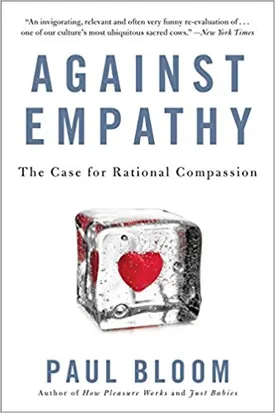Against Empathy: The Case for Rational Compassion by Paul Bloom
Paul Bloom’s 2016 book “Against Empathy: The Case for Rational Compassion” is a powerful argument against the idea that empathy is the only form of compassion. Bloom argues that empathy can be counter-productive and blind us to the objective truth of our environment. He makes the case that rational compassion should replace empathy in our decision making and that it has a better chance of achieving meaningful, consistent results.
In the book, Bloom examines the ways in which humans have long imagined empathy—from its origin as an act of sympathy to its modern interpretation as a basic response to suffering. He notes that this interpretation has been popularized by some of the biggest names in science and philosophy, including Charles Darwin and Bertrand Russell. He then argues that, despite this, empathy is not a reliable source of guidance.
Bloom points out that empathy, with its subjective and personal representation of the world, does not give us objective information about our environment. He argues that it can distort our view of the world and can lead to harmful decisions. Furthermore, Bloom argues that empathy often amplifies our biases and prejudices, which can prevent us from impartially judging situations. He claims that we often empathize with people that we know and like, while disregarding the suffering of those we are unfamiliar with.
Bloom proposes that we replace empathy with rational compassion, which he defines as “a kind of dispassionate, or even cold-hearted, understanding of the world and its inhabitants that allows us to make wise decisions.” In contrast to empathy, rational compassion forces us to see situations clearly and objectively, rather than through a filter of emotion. By removing empathy from our decision making, Bloom asserts, we can begin to consider people in a more equal way.
The main argument Bloom makes in Against Empathy is that relying on empathy to guide our behavior can blind us to the true nature of our environment. He claims that it can prevent us from seeing an impartial, accurate picture of our world, as we often empathize with those that are closer to us. We do not necessarily feel for those who are more distant from us. As such, Bloom believes that we must look beyond empathy and to a more unbiased source of inspiration for making decisions.
In the book, Bloom presents compelling arguments for the dangers of relying on empathy and the benefits of logic-based compassion. He not only explains why the two methods of understanding the world differ, but also provides evidence to suggest that rational compassion might be a better option in many cases. His thought-provoking argument makes it an essential read for anyone interested in the subject of empathy and compassion.

